
Rodgers and Hammerstein was a theater-writing team of composer Richard Rodgers (1902–1979) and lyricist-dramatist Oscar Hammerstein II (1895–1960), who together created a series of innovative and influential American musicals. Their musical theater writing partnership has been called the greatest of the 20th century.

Alfred Drake was an American actor and singer.

The Gielgud Theatre is a West End theatre, located on Shaftesbury Avenue, at the corner of Rupert Street, in the City of Westminster, London. The house currently has 986 seats on three levels.
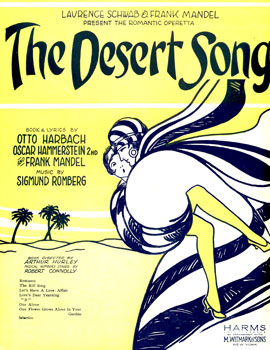
The Desert Song is an operetta with music by Sigmund Romberg and book and lyrics by Oscar Hammerstein II, Otto Harbach and Frank Mandel. It was inspired by the 1925 uprising of the Riffs, a group of Berber fighters, against French colonial rule in Morocco. It was also inspired by stories of Lawrence of Arabia aiding native guerrillas. Many tales romanticizing Saharan North Africa were in vogue, including Beau Geste and The Son of the Sheik.

Richard Tauber was an Austrian lyric Tenor and film actor. He sang the tenor role in number of operas, including Don Giovanni by Mozart and Da Ponte.
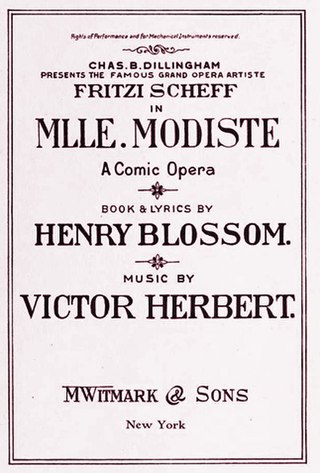
Mlle. Modiste is an operetta in two acts composed by Victor Herbert with a libretto by Henry Blossom. It concerns hat shop girl Fifi, who longs to be an opera singer, but who is such a good hat seller that her employer, Mme. Cecil, discourages her in her ambitions and exploits her commercial talents. Also, Fifi loves Etienne de Bouvray, who returns her love, but his uncle, Count Henri, opposes their union. The operetta features the song "Kiss Me Again".
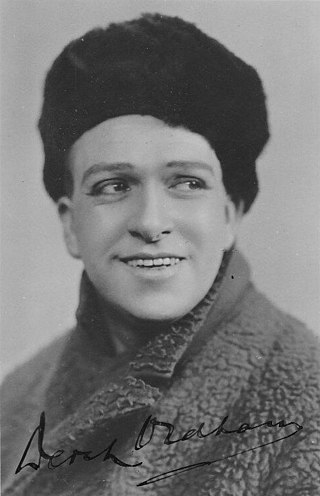
Derek Oldham was an English singer and actor, best known for his performances in the tenor roles of the Savoy Operas with the D'Oyly Carte Opera Company.
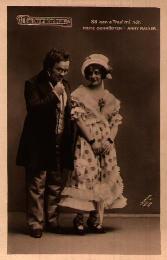
Das Dreimäderlhaus, adapted into English-language versions as Blossom Time and Lilac Time, is a Viennese pastiche operetta with music by Franz Schubert, rearranged by Heinrich Berté (1857–1924), and a libretto by Alfred Maria Willner and Heinz Reichert. The work gives a fictionalized account of Schubert's romantic life, and the story was adapted from the 1912 novel Schwammerl by Rudolf Hans Bartsch (1873–1952). Originally the score was mostly Berté, with just one piece of Schubert's, but the producers required Berté to discard his score and create a pasticcio of Schubert music.

Orville Harrold was an American operatic tenor and musical theatre actor. He began his career in 1906 as a performer in operettas in New York City, and was also seen during his early career in cabaret, musical theatre, and vaudeville performances. With the aid of Oscar Hammerstein I, he branched out into opera in 1910 as a leading tenor with Hammerstein's opera houses in New York City and Philadelphia. While his career from this point on primarily consisted of opera performances, he periodically returned to operetta and musical theatre throughout his career. He notably created the role of Captain Dick Warrington in the world premiere of Victor Herbert's operetta Naughty Marietta in November 1910.

Marta Eggerth was a Hungarian actress and singer from "The Silver Age of Operetta". Many of the 20th century's most famous operetta composers, including Franz Lehár, Fritz Kreisler, Robert Stolz, Oscar Straus, and Paul Abraham, composed works especially for her.
Nico Dostal was an Austrian composer who later specialised in operetta and film music.
Lillie Claus-Dostal (1905–2000) was an Austrian lyric coloratura opera and operetta singer.
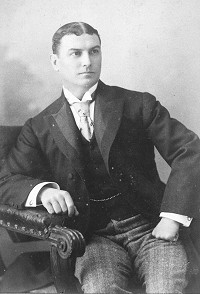
Henry Bracy was a Welsh opera tenor, stage director and opera producer who is best remembered as the creator of the role of Prince Hilarion in the Gilbert and Sullivan comic opera Princess Ida. Bracy often played the leading tenor role in the works in which he appeared, becoming one of the most popular comic tenors of the Victorian era. His wife, Clara, was an actress.
Albin Swoboda Jr. was a German operatic bass-baritone. Born in Dresden, he was the son of tenor and actor Albin Swoboda Sr. and soprano Friederike Fischer; both of whom were luminaries of the "Golden Age" of Viennese operetta. His grandfather, Joseph Wilhelm Swoboda, also had an important career as a tenor and opera director in Vienna. In 1910 he became romantically involved with opera singer Anna Sutter. Sutter had broken off a relationship with conductor Aloys Obrist around the same time, and Obrist became highly distraught by the situation. On 29 June 1910, Obrist broke into Sutter's apartment, murdered her, and committed suicide in the presence of Swoboda who was unable to stop him.

Clivia is a 1954 West German musical film directed by Karl Anton and starring Claude Farell, Peter Pasetti and Paul Dahlke. It is an adaptation of the 1933 operetta Clivia by Nico Dostal and is part of the subgenre of operetta films. It was shot at the Spandau Studios in Berlin and on location in Mallorca. The film's sets were designed by the art directors Karl Weber and Erich Grave.
Manina is a 1942 German-language operetta by Nico Dostal to a libretto by Hans Adler and Alexander Lix. It was premiered 28 November 1942 at the Admiralspalast in Berlin.
Monika is a 1937 operetta by Nico Dostal to a libretto by Hermann Hermecke. The premiere was 3 October 1937 in Stuttgart.
Die Vielgeliebte is a 1934 operetta by Nico Dostal to a libretto by Franz Maregg and Rudolf Köller.
Margit Schramm was a German soprano in operetta, opera and song. She also appeared as a film actress and hosted a television show. In the 1960s, she became known as an operetta diva on stage, German television, in numerous concerts and in films, where she often appeared together with her favourite stage partner, the tenor Rudolf Schock.
Nancy McCord was an American soprano and actress who had an active career in opera, musical theatre, and vaudeville during the 1920s, 1930s and early 1940s. She appeared in operettas and musicals on Broadway and in operas with several American companies, including the St. Louis Municipal Opera and the Metropolitan Opera. Her repertoire consisted mainly of roles from light opera and operettas. She is best remembered for creating the roles of Marie-Baroness von Schlewitz in the original production of Oscar Hammerstein II and Sigmund Romberg's May Wine (1935); and Mary Stone in the world premiere of Douglas Moore's The Devil and Daniel Webster (1939). She also performed leading roles in the United States premieres of two operettas: Franz Lehár's The Land of Smiles and Robert Stolz's Venus in Seide.











